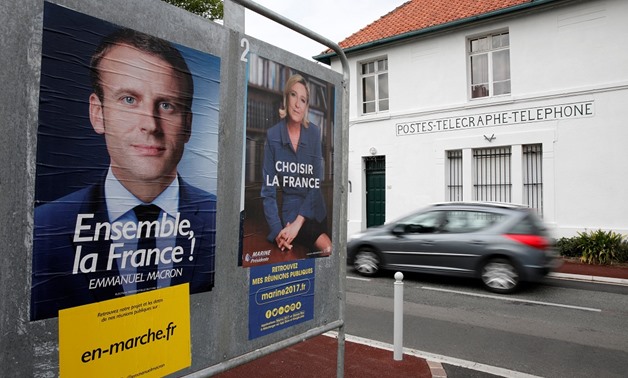
French President Emmanuel Macron poses for a "selfie" after a visit of the ruins in the French martyr village of Oradour-sur-Glane _Reuters
Paris - 10 June 2017:French voters go to the polls on Sunday in the first round of a legislative election with newly elected President Emmanuel Macron keen to win a strong parliamentary majority to push through reforms.
His victory in May was a political earthquake for France, and his Republique en Marche (Republic on the Move, REM) are aiming to win an absolute majority in the second round on June 18.
Here are key facts you need to know about the election:
There are 577 lawmakers up for election, including 11 who represent French who live overseas. Each constituency represents about 125,000 inhabitants.
If no candidate wins over 50 percent in the first round, the two top-placed go into the second round -- as well as any candidate who won the votes of more than 12.5 percent of the electorate.
A total of 7,882 candidates are standing nationwide in a process expected to produce a deep renewal of parliament -- not least because over 200 of the outgoing lawmakers are not running for re-election.
The average candidate's age is 48.5 years and more than 42 percent are women. In the outgoing parliament women represented only 26.9 percent of deputies, or 155 out of 577, which was itself a record.
The media-savvy Macron is hoping to use the momentum from his presidential victory over seriously weakened traditional right and leftwing parties to build a large majority in parliament.
With half of Republique En Marche candidates coming from civil society, he hopes notably to tackle reform of the traditionally thorny issue of labour law.
If he fails to win an absolute majority -- 289 out of 577 seats -- it would complicate his job as president as he would have to build a coalition with right and left.
The far-right National Front of his defeated presidential rival Marine Le Pen and the radical left will both also be seeking to capitalise on the move away from established parties.
The party of ex-PM and scandal-wracked former presidential candidate Francois Fillon is hoping to take its revenge, even to impose a rightwing cohabitation on the centrist president. But with 50 of its lawmakers not standing again, it could lose more support to REM.
The Communist-backed Jean-Luc Melenchon scored 19.6 percent in the first round of the presidential ballot. His France Insoumise (France Unbowed) movement is putting up candidates in 500 constituencies, and hopes to win at least 15 seats in the National Assembly to form a parliamentary group.
Weakened after the poorer-than-expected score by its leader Marine Le Pen in the presidential run-off against Macron (33.9 percent), the National Front nonetheless wants to present itself as the main opposition after she secured 10.7 million votes in May.
The far-right party hopes to win at least in the 45 constituencies where Le Pen won more than 50 percent in the head-to-head on May 7, but it could be an uphill battle, especially after the withdrawal from political life of her niece Marion Marechal-Le Pen, which dealt the party a blow in its southern heartland.
The left-wing party that formed the previous government needs to avoid all-out collapse. After a historically low score in the first round of the presidential election (6.3 percent for Benoit Hamon), the stakes could hardly be higher. Part of its electorate has left for Macron, others for Melenchon's party.
Some are already bracing for another bleak election night for a party which has long been one of the two mainstream forces in French politics. Older heads recall the debacle of 1993 which produced 57 socialist and allied deputies, in what would turn them into a residual group plunged back into crisis.

Comments
Leave a Comment